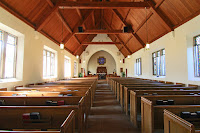Ekklésia – The Assembly

The New Testament usage of the term “ assembly ” is based on the language and imagery of Israel when the nation was assembled before Yahweh for worship in front of the Tabernacle. The Greek noun rendered “ church ” in many English translations is ekklésia . It means “assembly, congregation, convocation.” In secular Greek, it could refer to an “assembly” of citizens gathered to conduct matters of state. However, that is not the sense found in the Greek New Testament.







